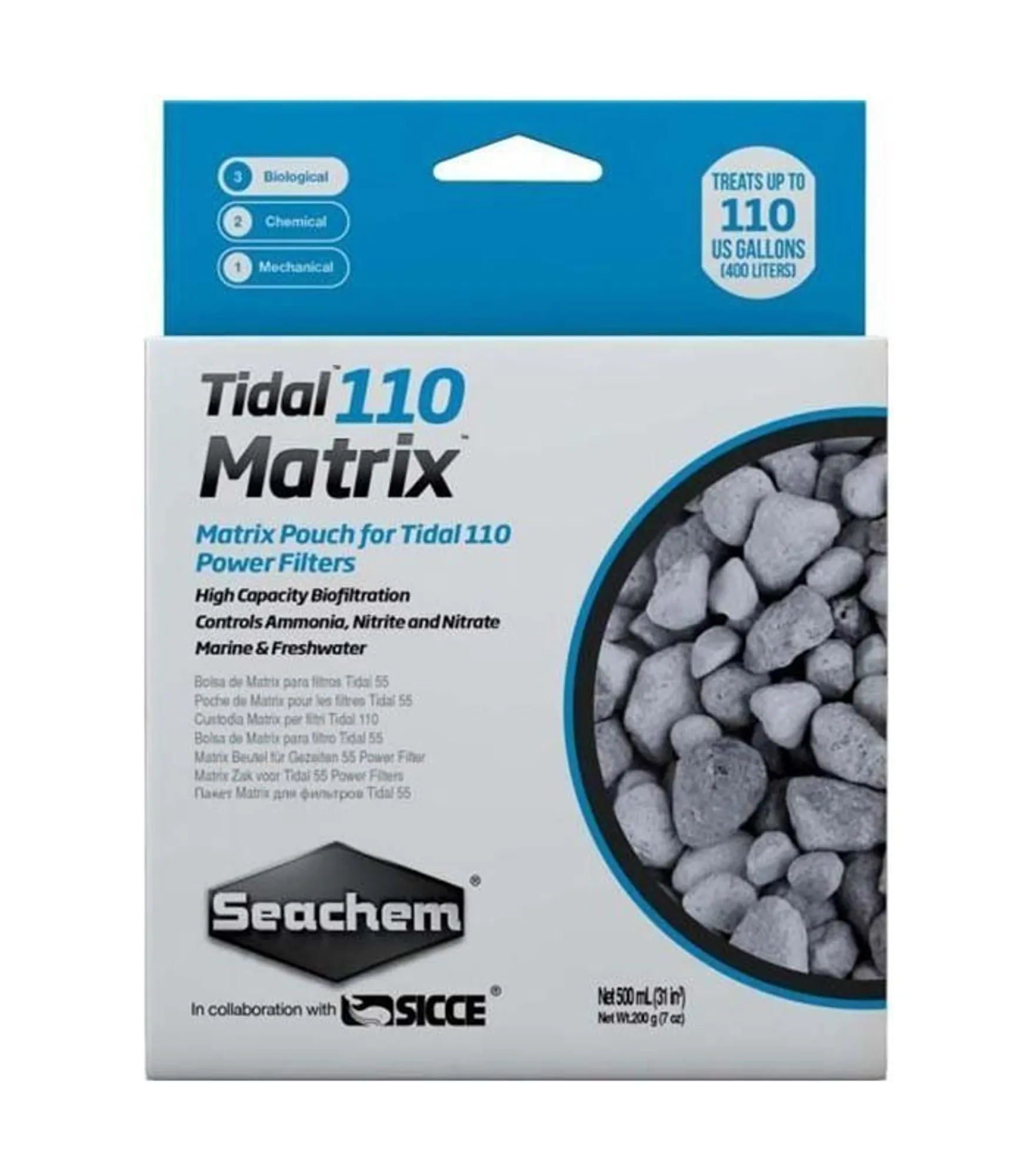

Product Details
Seachem Tidal Matrix is a highly porous bio media that promotes biofiltration removal of nitrogenous waste. It is inert, does not breakdown, can be washed and reused. Hence the media need not be replaced, and can be used long term, making it very cost effective.
Advantages
Matrix is a high-porosity bio media that provides efficient biofiltration for the removal of nitrogenous waste. Matrix is a porous inorganic solid about 10 mm in diameter. Each litre of Matrix provides as much surface (>~700 m2) as 170 litres of plastic balls! Plastic bio-materials provide only external surface area, whereas Matrix provides both external and internal macro-porous surface area. These macro pores are ideally sized for the support of nitrifying and denitrifying bacteria. This allows Matrix, unlike other forms of biomedia, to remove nitrate along with ammonia and nitrite, simultaneously and in the same filter.
Matrix is completely inert and will not breakdown. It need not be replaced. Since the majority of the bacteria are internal, Matrix may be rinsed when needed without damaging the filter. Matrix is compatible with all types of wet or wet-dry filters.
Directions
Use 250 mL of Matrix for each 200 L (50 US gallons)** of water. Matrix may be placed in any kind of filter, and is particularly effective in a canister filter. Matrix is sufficiently large that no filter bag should be required for most applications. Matrix works well in drip tray systems, but you may find that the larger Pond Matrix is better suited for such applications. Use with Stability to more rapidly establish the bio-filter.
**This dosage may differ from your packaging. Based on updated studies, we've found Matrix treats even more water than previously asserted.
FAQ
I saw on the internet that Matrix is just pumice. Is that true?
A: We certainly understand why people look at Matrix and compare it to pumice; they are both porous stones. But remember, not every porous stone is the same. Matrix is a specific type chosen for its extremely high porosity, pore size, durability, and inert nature. When you buy Matrix, you know what you are getting. It has been tested in the lab and in thousand of hobbyist's aquariums for more than a decade with excellent results. You aren't just purchasing the physical material when you buy a container of Matrix; you are purchasing the research which has sourced and tested this specific type of stone, and the assurance that it is safe for use in your aquarium.
I'm using Matrix, but my nitrates are not coming down, it's been at the same level for awhile now, what's wrong?
A: Nothing's wrong. The product is working just as it should. The removal of nitrates essentially comes down to one parameter: rate. The rate at which your tank is producing nitrates and the rate at which it can remove them. If you fill a bathtub with the spigot wide open and try to keep it from overflowing by draining it out of a straw, it won't be long until it overflows. However, if you drain it at the same rate it fills, the level will always stay the same. Or, if it nearly fills up and then you drain it at a rate faster than it is filling, the level will drop. The same applies to nitrate removal. To lower nitrates you must equip your tank with the capacity to remove them at a rate greater than or equal to the rate of formation. So, if your nitrates are holding steady and you want them to come down, increase the amount of Matrix you are using or use de-nitrate in addition to the Matrix (de-nitrate will more efficiently remove nitrates per volume of product assuming a flow rate of not more than ~50 gallons/hour). If you need to use a higher flow rate, than stick with Matrix or try Pond Matrix, both of which support anaerobic denitrification at higher flow rates.
How often do I need to rinse or replace Matrix?
A: Matrix is a biomedia, meaning it does not exhaust over time, so you should never need to replace it. That said it is possible for Matrix media to become clogged up with detritus and slime, so we recommend regular filter maintenance to ensure it continues working as efficiently as possible. The frequency with which a canister filter needs to be opened and cleaned out varies from tank to tank, but a good starting point is once a month.
Where should I put Matrix in my filter?
A: We recommend that water flow through filter media in this order:
Mechanical filtration (filter floss, sponges, etc.)
Chemical filtration (MatrixCarbon, PhosGuard, Purigen, etc)
Biological filtration (Matrix)
Every filter is different, so the exact placement of Matrix will vary from brand to brand. Consult your filter's instruction manual to find the direction of flow for your filter.
If I'm using Matrix do I need to use de-nitrate as well?
A: That depends on a number of things. If Matrix is doing the job for you (i.e. keeping nitrite/nitrate under control) then, no. If you're running a flow rate higher than 50 gallons/hour, then you won't be able to use de-nitrate anyway since it requires a flow rate slower than that to support the denitrifying bacteria. If filter size and capacity are an issue, then de-nitrate will provide a more efficient removal of nitrate per volume of product (i.e. you can use less de-nitrate by volume than Matrix to get the same denitrifying capacity). Also, de-nitrate has the capacity to remove nitrates by chemical absorption on initial use of the product, although if nitrate levels are very high (above 20 mg/L) we recommend a water change as the most economical approach to getting your nitrate level down before putting these products into service.
How long does it take for Matrix to grow the necessary anaerobic bacteria to remove nitrate?
A: This all depends on the stage of biological establishment of your tank, placement of Matrix and flow rate. Generally you will start to see improvement in a couple of weeks but every situation varies.
If I buy a small hang-on-tank filter, and fill it solely with Matrix, will that be effective? What is the best type of filter to put Matrix in?
A: It will work but not nearly as well, a canister filter is recommended.
Will using Matrix affect the pH of the water?
A: No, It is an inert media that will not directly impact your pH.
Is it theoretically possible to achieve near-zero nitrate levels using Matrix?
A: If you have a fish load it would be extremely difficult to bring down your nitrates to zero (fish foods, waste being introduced on a daily basis). However, it will help maintain your nitrates at lower levels.
I received my container of Matrix and some of the pieces look darker or lighter than the rest. Is this normal?
A: Not to worry! Matrix has some natural variations in color and size of the pieces, ranging from very light to quite dark. It is normal to see some color differences from one piece of Matrix to the next.
SEACHEM TIDAL 110 MATRIX 500ML (SC-6508)
Product Options
500ml
Delivery
Quantity
N30 Ang Mo Kio
Visit shop
Aquarium Fishes, Tanks & Supplies From N30 Ang Mo Kio


 SG
SG


